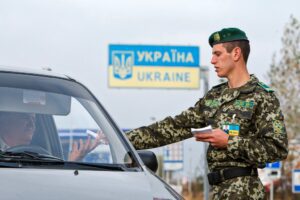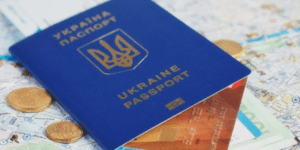
According to preliminary information from the Ukrainian Embassy in Israel, on June 14, as a result of a massive missile attack by Iran against Israel and a missile hitting a residential building in Bat Yam, five Ukrainian citizens were killed, including three minors, the Ukrainian Foreign Ministry reported.
According to the ministry, the identities of the victims are currently being established.
Ukrainian diplomats and consuls are in close contact with the Israeli police and other services to identify and organize the repatriation of the bodies of the victims.

Almost half of Ukrainians (44%) note that when buying food they more often try to buy the cheapest products, less because of their quality, according to the results of a sociological survey conducted by the sociological service of the Razumkov Center on September 20-26 and presented at a press conference at the Interfax-Ukraine agency on Wednesday.
At the same time, the same number of those who more often allow themselves to buy better quality products, even if they are more expensive (45%). The remaining 11% of respondents found it difficult to answer.
“After the beginning of full-scale aggression compared to June 2021, both the share of citizens answering that they make ends meet, there is not enough money even for necessary products (from 9% to 12% in September 2024. ), as well as the share of those who answered that they live well, but are not yet able to make some purchases (apartment, car) (from 6% to 9%), while the share of those who answered that their family in general has enough to live on, but the purchase of durable goods, such as furniture, refrigerator, TV, is already causing difficulties (from 44% to 41%)”, – noted in the results of the study.
Compared to 2005, from 38% to 54% increased the share of citizens who receive the main part of their livelihood from wages, and from 38% to 29% decreased the share of those who live mainly from pensions, scholarships, financial aid or alimony. From 7% to 2.5%, the share of those living from stocks or income from subsidiary farms, land plots, from 5% to 3% – from side jobs, from 3% to 2% – from income from entrepreneurship decreased.
The face-to-face survey was conducted in all territories controlled by the Government of Ukraine and where no hostilities are taking place, among 2016 respondents aged 18 years and older. The sample structure reproduces the demographic structure of the adult population of the territories where the survey was conducted as of the beginning of 2022 (by age, gender, type of settlement). The theoretical sampling error does not exceed 2.3%. Additional systematic sample deviations may be due to the consequences of Russian Federation aggression.

The U.S. Department of Homeland Security announced an 18-month extension of Temporary Protected Status for citizens of Ukraine until April 19, 2025, due to Russia’s ongoing full-scale invasion.
“Today, the Department of Homeland Security (DHS) announced an 18-month extension of Ukraine’s Temporary Protected Status (TPS), from October 20, 2023, to April 19, 2025, due to the ongoing armed conflict and extraordinary and temporary conditions in Ukraine that prevent safe return,” the Department of Homeland Security said in a statement on its website Friday.
The program will also be expanded to allow Ukrainians who were living in the U.S. as of Aug. 16, 2023, to apply for temporary protection.
In addition, students from Ukraine who study in the U.S. and are in the country on an F-1 visa will be able to apply for work authorization and workload reduction without losing their visa for the duration of temporary protection.
Reportedly, approximately 26,000 Ukrainians now enjoy temporary protection in the U.S., and another 166,700 may be eligible. “Current beneficiaries who wish to extend their temporary protected status must re-register in a timely manner during the 60-day re-registration period from August 21, 2023 to October 20, 2023,” the report said.
“Russia’s ongoing military incursion into Ukraine and the resulting humanitarian crisis require the United States to continue to provide security and protection to Ukrainians who may not be able to return to their country,” said U.S. Secretary of Homeland Security Alejandro Mayorkas, who is quoted in the report.

More than 244,000 people applied for asylum in Germany last year, with citizens of Syria topping the list, the Associated Press reported Wednesday.
The agency notes that according to German statistics, citizens of Afghanistan, Turkey and Iraq followed the Syrians in the list.
In addition, more than a million citizens of Ukraine arrived in the country, but they do not have to apply for asylum, because they immediately receive a temporary residence permit.
Berlin notes that in 2022 the number of refugees increased by 27.9% compared to 2021, especially in the last three months of 2022.
German Interior Minister Nancy Feser said the government is trying to integrate refugees as quickly as possible in the life of the new place, for this purpose, German language lessons are held, and many other measures are taken. At the same time, she noted that German authorities are trying to do everything possible to deport from the country as soon as possible those who have been denied asylum.

Since the start of the full-scale war, 140-150 thousand Ukrainians have come to the UK, the Ukrainian ambassador to the UK Vadym Pristayko said.
“About 200 thousand visas have been issued. Reached British shores about 140-150 thousand. This figure fluctuates: someone has to go back to Ukraine, someone settled for a longer period, children went to school. All the Ukrainians who came here received financial assistance, they are connected to free programs, to the health care system. I am sure Ukrainians feel protected. There are many opportunities for employment,” Prystayko said at a briefing at the Ukraine Media Center.
According to some estimates, as the ambassador noted, “already half of all adult Ukrainians who have moved here have some kind of job.

Minister of Social Policy Oksana Zholnovich hopes that it will be possible to avoid dual residency for Ukrainian citizens abroad.
“There are risks, but I think that it will be possible to avoid dual residency. During the last conversation, when we had the Minister of Social Policy and Labor of Germany, I asked him this question. In particular, that we have problems, since Germany is very many of our people who continue to work in Ukraine remotely or as FOPs and pay taxes here, and is there a need for them to register? He could not answer, because this is also a challenge for them. This is a new tool that has yet to be developed in Europe” , – Zholnovich said in an exclusive interview with Interfax-Ukraine, commenting on the situation with negotiations with international partners regarding tax residency for Ukrainian citizens abroad.
As for the prospect of introducing general pension payments for displaced Ukrainians who received the status of temporary protection and worked in the countries of the European Union, the minister said that this can only be under bilateral agreements that Ukraine has already signed on the mutual recognition of insurance experience.
Answering a clarifying question whether any new global projects on this topic are being considered in connection with the current circumstances, Zholnovich noted that Ukraine is in the process of European integration, and there are relevant EU directives that allow something like this.
“But this will be a movement in both directions. That is, if we conclude an agreement that our citizens working in Poland are counted for insurance experience, then we must also credit and pay pensions to Poles working in Ukraine. This is painstaking work, which involves the synchronization of two pension systems of each individual country. Obviously, it will continue, but we must also take into account our economic situation. If the Ukrainian pension in the UK is very easy to pay, then the UK pension in Ukraine is not quite,” she stated.
ABROAD, dual residence, Minister Social Policy, UKRAINIAN CITIZENS